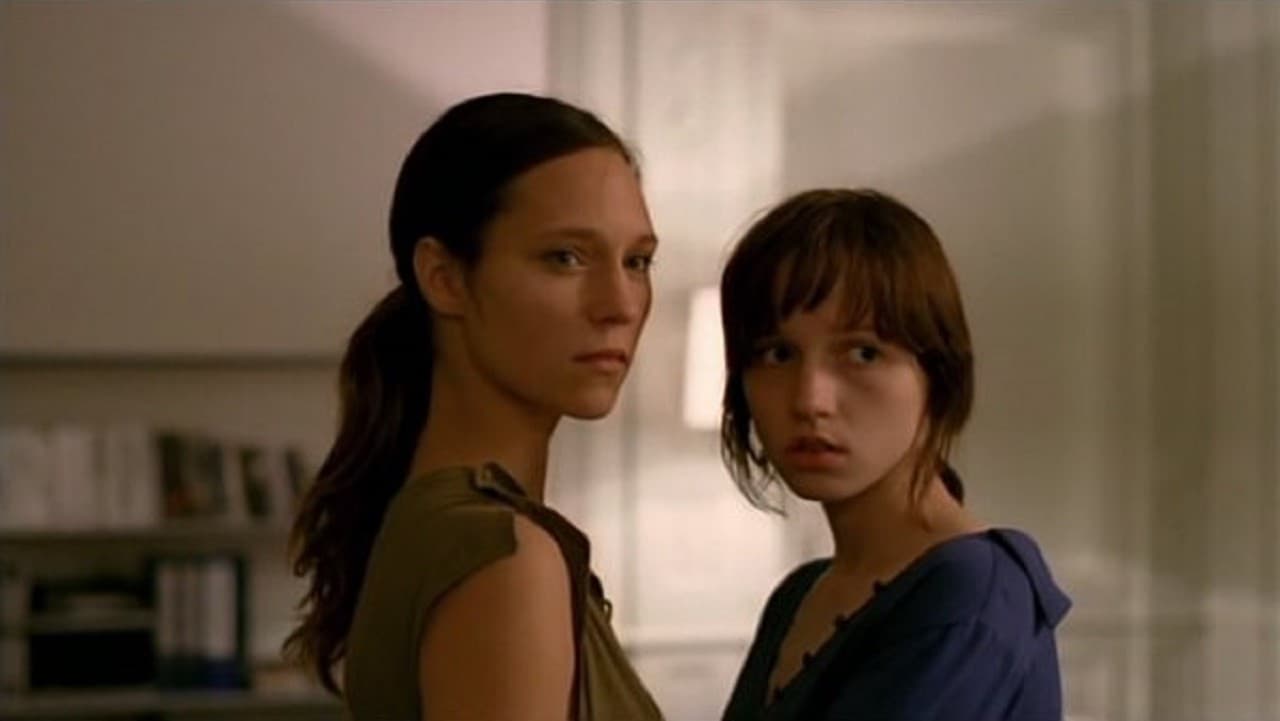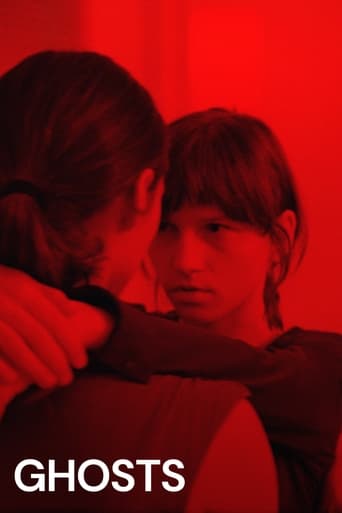

"Gespenster" is a German movie from over 10 years ago written and directed by Christian Petzold, one of Germany's most known filmmakers these days. Today he is mostly known for his collaborations with Nina Hoss, but she does not appear in this one here. Benno Fürmann, however, does and you could call him Petzold's muse back then as he also appeared in many of his works. Here, however, Fürmann's role is fairly small, which is fine for me as I am not the greatest fan of him as an actor. The screenplay is also by Petzold in collaboration with the late Harun Farocki, an author Petzold worked with on many occasions. So there are some familiar factors in this work. This does not really apply though to the lead actresses I believe. Julia Hummer plays the main character and the co-lead is Sabine Timoteo. And their chemistry is pretty good, which is one reason why I enjoyed the watch. But the main reason is Julia Hummer's quietly convincing turn as a young woman looking to be loved, first by another girl, then by a woman who appears to be her mother.And Hummer really does an outstanding job and she delivers all one can ask for in terms of how the character was written. Speaking about writing, Petzold and Farocki did a good job here too. The characters all seem realistic in my opinion and their interactions make totally sense. One of Petzold's big strengths is always that his character have great shades. They are all flawed, but do not tend to one side (good or bad) too much, but still many director attempt that and succeed, but then it seems just for the sake of it. However, here it feels really raw and spot-on and this makes me happy. The only aspect I did not like here was the plot twist at the very end, which seemed slightly unrealistic to me. I wish they could have kept the approach they gave the film all the time before that. No need to go out on a shocking note. I do prefer realistic endings over happy endings if these happy endings seem nonsensical and forced, but here an actual mother-daughter reunion would have been the best way to close it I think. This is maybe also the reason why I gave it "only" a ***/***** and not a ****/*****. I was pretty close to the higher rating. But this does not change my overall recommendation for "Ghosts". This was a good watch and Hummer's performance alone makes it truly worth the watch. It makes me kinda sad that she has faded pretty much completely out of the spotlight a decade later. But at least we have the greatness she left us here. Go watch it.
... View More"Ghosts" (2005 release from Germany; 85 min.; original title "Gespenster" a/k/a "Ghost, not in plural) brings the story of Nina (played by Julia Hummer), a teenager whom we first meet when she is doing community work in a park in Berlin. Nina happens to meet Toni (played by Sabine Timoteo), a twenty-something woman who is a drifter. Nina wants to help her in any way she possibly can (which is not much). In a parallel story line, we get to know a French couple, the wife of which seems a very troubled woman who is looking for a young lady whom she thinks is her long-lost daughter. To tell you more would spoil your viewing experience, you'll just have to see for yourself how it all plays out.Several comments: this movie is written and directed by Christian Petzold, one of Europe's top directors in my humble opinion. Some of his other works include 2000's "The State I'm In" (also starring Julia Hummer), 2007's "Yella" and the excellent political thriller "Barbara" from 2012. I'll go see anything from this guy. Second, even though Amazon lists this as a 2009 release, it really was released in 2005. Third as already mentioned, Julia Hummer reappears in a Petzold film. Here she is pushing her age limit (she is 25 in real life, playing a 16 or 17 yr old), but it doesn't take away from the immense talent that she is. (She would appear also in Petzold's "Carlos" TV mini-series.) Fourth, the movie does a great job setting up the various characters, and is not afraid to let you wonder for quite some time as to how all the pieces fit together. A movie that challenges the mind, what a concept! Iron Man 3 this ain't. At just 85 min., this movie flew by in no time and at the end of it I didn't want to say goodbye to these characters. What better compliment can you give a movie? Bottom line: if you are in the mood for a top-notch foreign movie that challenges your mind and lets you do some of the mental work yourself, you cannot go wrong with this. "Ghosts" is another great film from German director Christian Petzold that begs to be seen. HIGHLY RECOMMENDED!
... View More"Gespenster" (2005) forms, together with "Yella" (2007), and "Jerichow" (2008), the Gespenster-trilogy of director Christian Petzold, doubtless one of the creme-De-la-creme German movie directors of our time.Roughly, "Gespenster" tells the story of a French woman whose daughter had been kidnapped as a 3 years old child while the mother turned around her head for 1 minute in Berlin - and has never been seen ever. Since then, the mother keeps traveling to Berlin whenever there is a possibility and searches, by aid of time-dilated photography, for girls of the age of approximately the present age of her age. As we hear later in the movie, the mother was already a lot of times convinced that she had found her daughter Marie. However, this time, when she meets Nina, everything comes quite different.The movie does not bring solutions, not even part-solutions, and insofar, it is rather disappointing. We are not getting equipped either in order to decide if the mother is really insane or not, if her actual daughter is still alive or not. Most disappointing is the end. After what we have witnessed in the movie, it is an imposition for the watcher that he is let alone as the auteur leaves Nina alone. The simple walking away symbolizing that nothing has changed, can be a strong effect of dramaturgy (f.ex. in "Umberto D."), but in "Gespenster", it is displaced.Since critics have been suggesting Freudian motives in this movie, let me give my own attempt: Why is it that similar persons do not know one another, especially not the persons that another similar person knows? This is quite an insane question, agreed, from the standpoint of Aristotelian logic, according to which the notion of the individual holds. The individual is such a person that does not share any of its defining characteristics with anyone else. So, the Aristotelian answer to my question is: They do not know one another because their similarity is by pure change. Everybody who is not insane, believes that. However, what about the case if these similar persons share other similarities which can hardly be by change, e.g. scarfs on their left under ankle or a heart-shaped birthmark under their right shoulder-blade? This is the metaphysical context out of which this movie is made, although I am not sure whether even the director has realized that. Despite our modern, Aristotelian world, the superstition, conserved in the mythologies of people around the globe that similar people also share parts of their individuality, and that individuality, therefore, is not something erratic, but rather diffusional, so that the borders between persons are open, such and similar believes build a strong backbone of irrational-ism despite our otherwise strongly rational thinking - a source of Gespenster of the most interesting kind.
... View MoreI've seen this film more than once now, and there's always someone complaining about the "obvious construction" of the plot afterwards. But then - this is part of Petzold's game: he plays along with the rules of genre.It's very nice, how the highly improbable story of how the two girls (Timoteo/Hummer) meet, is again mirrored in another, even more improbable story, that the girls make up for a casting. This film is a journey between fact and fiction, it's more about potentials, things that might have happened in the past or might be happening in the future, than it is about actual ongoings. It's a reverie, sorts of - so apt enough there are a lot of motives, Freud might have found interesting for his dream analysis, like all the "doppelganger"-constellations. Also, I think, "Gespenster" might be interesting to be watched in comparison to current Asian cinema of the uncanny: Petzold's everyday urban architecture also feels haunted in an unobtrusive, strangely familiar way. This film is not about the obvious. To describe it as the story of two girls who meet and eventually become friends and lovers, or as the story of an orphaned mother, who searches Europe for her lost daughter, clearly doesn't say much about the nature of "Gespenster" at all.
... View More